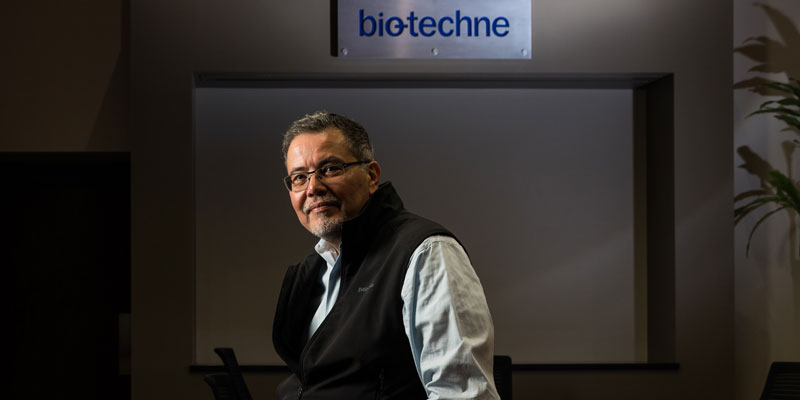With biology-based solutions moving into the foreground, cross-sector collaborations between industry and academia present a unique opportunity to drive innovation and train students.

Fernando Bazan spent the better part of his career at Bay Area biotechnology companies. He trained at Stanford, Berkeley and the University of California, San Francisco, where cross-pollination between industry and academia are integral to the identity and vitality of the institutions. Four years ago, he moved to Twin Cities–based Bio-Techne, a leading life sciences company, and saw an opportunity.
“The pace of discovery in the biological sciences over the last 20 years or so has been incredible,” says Bazan. “Keeping up with the state of the science is essential to staying in the lead. So when I started at Bio-Techne as the chief technology officer, one of the first things I did was to bring in people from the University for seminars and the opportunity to engage our scientists. I focused on early-career professors who are full of energy, brimming with ideas, and up on new methods and tools. It’s been transformative in terms of new collaborations and the adoption of new processes.”
Bazan sees a real opportunity for the creativity, entrepreneurial spirit and ingenuity so pervasive in Silicon Valley to take root here.
“The College of Biological Sciences has been very forward-thinking in hiring terrific young faculty in areas such as systems and synthetic biology, chemical biology, protein design and bioinformatics,” says Bazan. “These labs have naturally gravitated to working with each other and interfacing with like-minded groups from other colleges. It’s one of the best clusters of this sort that I’ve seen anywhere. Not only that, the College has been proactive in creating new spaces for cross-disciplinary collaborations, which are key incubators for discovery.”
Bazan is part of a committee advocating for the College of Biological Sciences campaign to attract investment for critical initiatives, including a new integrative program to ramp up internships and collaborations that reach beyond campus and engage both startups and established biotechnology and biomedical companies. Graduate students and postdoctoral fellows are a key component since they bring fresh thinking to companies and, in return, learn about opportunities beyond academia.
Moving quickly to make the most of this moment has major implications for the University and the state, says Bazan. “This is the century of biology. We are in an unprecedented position to figure out the molecular basis of biological systems across organisms and how these mechanisms respond to external threats — or go awry in disease. There are pressing challenges right now to human health and our environment, and biology is the common thread. There’s not going to be a field of science not affected or inspired by biology. The College of Biological Sciences is square in the middle of this vital conversation, and it’s going to be a very exciting place to be for years to come.”